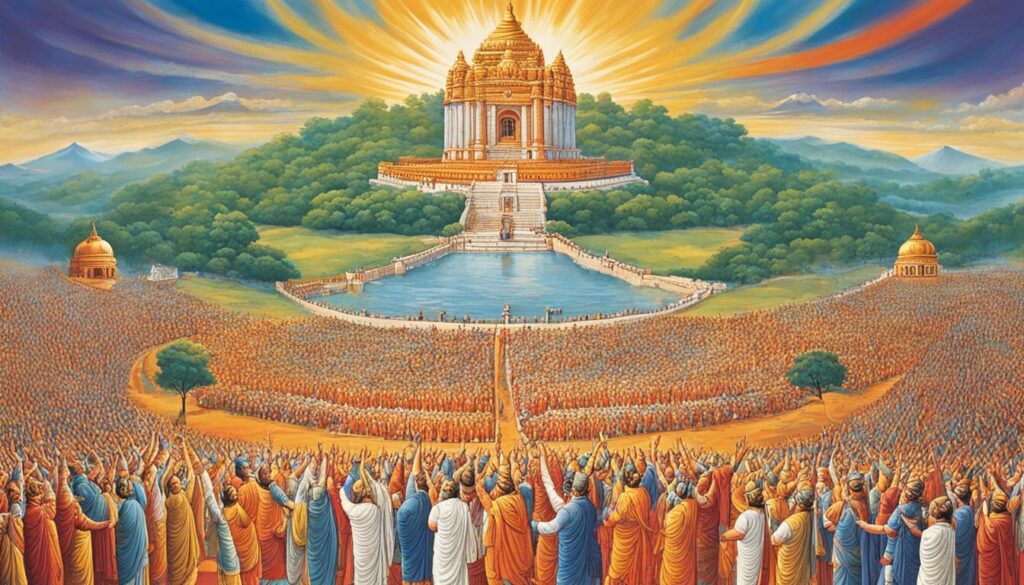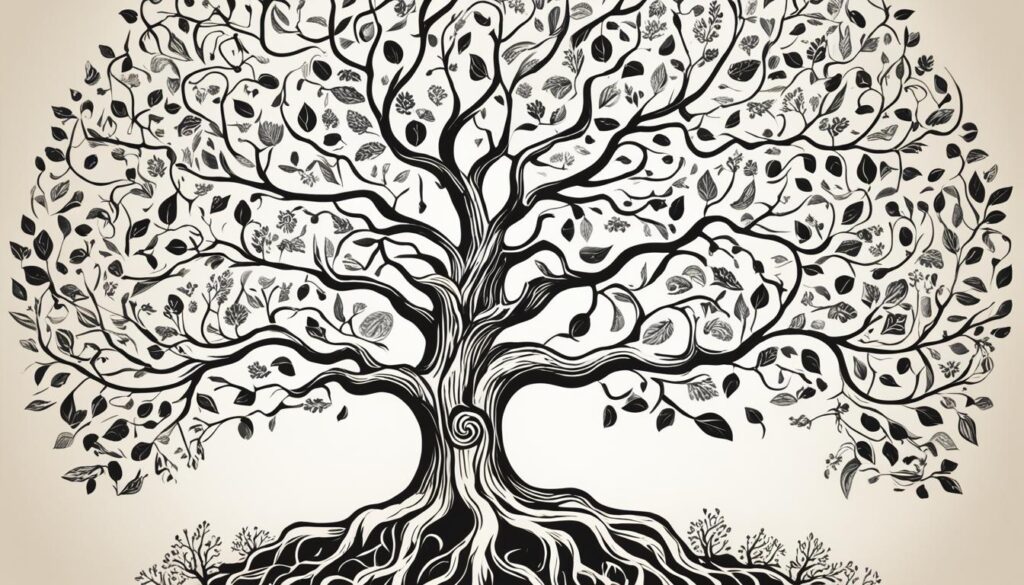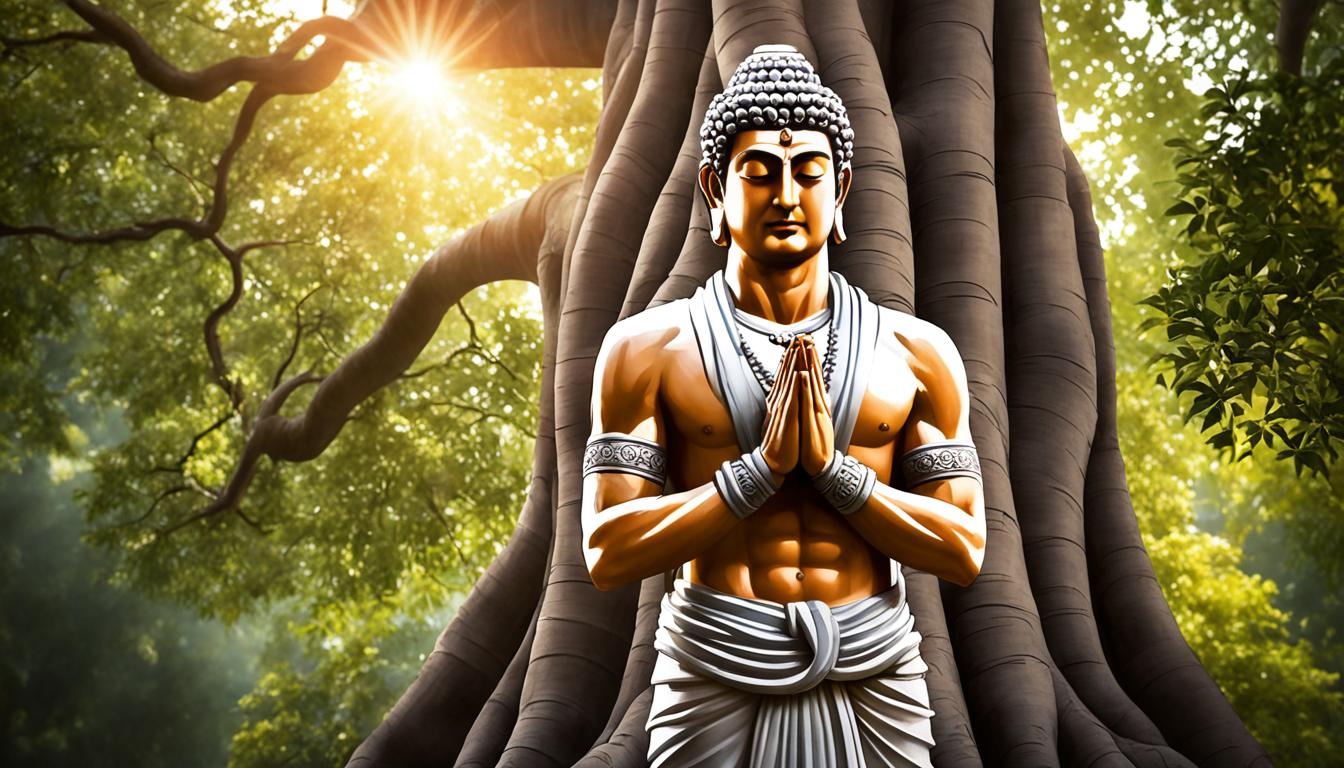Step back in time and explore the remarkable story of Ashoka, the Indian emperor who left a lasting impact on history. From a brutal era of conquest to a reign of peace and tolerance, Ashoka’s transformation is a testament to the power of personal change and visionary leadership.
But what event led Ashoka to convert to Buddhism, altering the course of his rule and shaping the Maurya Empire? Dive into the fascinating journey of Ashoka’s life and uncover the turning point that sparked his remarkable transformation.
Key Takeaways:
- Ashoka, also known as Ashoka the Great, was an Indian emperor who ruled over the Maurya Empire from 268 BC to 232 BC.
- His reign witnessed a significant transition from a period of expansion and conquest to a time of peace, tolerance, and social welfare.
- The event of Ashoka’s conversion to Buddhism played a pivotal role in reshaping his approach to governance and promoting non-violence.
- Ashoka’s legacy as a ruler is marked by his commitment to peace, compassion, and harmonious coexistence among diverse religious communities.
- His reign had a profound impact on the spread of Buddhism, as he actively patronized Buddhist institutions and propagated its teachings.
Impact of Ashoka’s Conversion to Buddhism
Ashoka, the Great Mauryan Emperor, underwent a profound transformation when he converted to Buddhism. His conversion had a far-reaching impact on his rule and the entire Maurya Empire. The catalyst for his conversion was the devastating Kalinga War, which left a deep imprint on his conscience.
The teachings of Buddhism resonated with Ashoka’s desire for a harmonious and compassionate society. Buddhism emphasizes non-violence, compassion, and inner peace, which aligned with Ashoka’s newfound belief system. Inspired by these principles, Ashoka implemented policies promoting religious tolerance, non-violence, and social welfare throughout his empire.
To propagate the teachings of Buddhism and encourage moral conduct, Ashoka sponsored the construction of Buddhist monasteries, engraved his rock edicts with Buddhist teachings, and erected pillars bearing his moral code. These pillars and edicts served as a means to spread Buddhism and its principles across the Indian subcontinent and beyond.
Through his conversion, Ashoka not only transformed his own rule but also facilitated the propagation and acceptance of Buddhism as a major religion. The impact of his conversion can still be felt today, as Buddhism continues to thrive in various parts of the world.
- Buddhism became an integral part of the Mauryan Empire’s cultural fabric.
- Ashoka’s conversion paved the way for increased religious tolerance within his empire.
- His policies promoting non-violence and social welfare bettered the lives of his subjects.
- The spread of Buddhism across different regions owes much to Ashoka’s patronage.
- His conversion remains an influential milestone in the history of both India and Buddhism.
Ashoka’s Contribution to Buddhism
Ashoka, the visionary ruler, made significant contributions to the promotion and spread of Buddhism during his reign. He actively supported and patronized Buddhist institutions, leaving a lasting impact on the growth and development of the religion.
One of Ashoka’s remarkable contributions was the construction of numerous Buddhist monasteries across his empire. These monasteries provided spaces for monks and nuns to practice and propagate Buddhism. Notably, Ashoka sponsored the construction of the iconic Mahabodhi Temple in Bodh Gaya, a sacred site where Gautama Buddha is said to have attained enlightenment.
Furthermore, Ashoka’s reign is marked by the erection of pillars and rock edicts that prominently displayed Buddhist teachings and moral principles. These pillars and edicts served as powerful reminders of Ashoka’s commitment to non-violence, compassion, and righteousness. They played a crucial role in propagating Buddhism, spreading Ashoka’s message, and reinforcing the values of the religion.

Ashoka’s contributions were instrumental in the development and consolidation of Buddhism as a major religious and philosophical tradition. Through his patronage, Buddhism gained prominence and flourished not only within the Maurya Empire but also across the Indian subcontinent and beyond.
Let’s explore Ashoka’s enduring impact on the Maurya Empire and the Indian subcontinent in the next section.
Ashoka’s Legacy of Peace and Tolerance
Ashoka, the Mauryan emperor who converted to Buddhism, left behind a profound legacy of peace and tolerance that continues to inspire generations. Inspired by the teachings of Buddhism, Ashoka underwent a transformative change in his approach to governance, prioritizing social welfare, religious tolerance, and non-violence.
Under Ashoka’s rule, the Maurya Empire witnessed significant advancements in the well-being of its subjects. He implemented policies that aimed at promoting the welfare of all citizens, including initiatives such as providing medical care, constructing irrigation projects, and implementing animal welfare measures.
Ashoka’s commitment to religious tolerance was remarkable for his time. He recognized and respected the diversity of religious beliefs within his empire, encouraging his subjects to practice their own faiths without discrimination. This inclusive approach fostered an environment of coexistence and harmony among different religious communities.
The enduring impact of Ashoka’s legacy is evident in the principles of governance and social harmony that continue to shape societies today. His conversion to Buddhism and subsequent emphasis on peace and tolerance set the stage for future rulers, inspiring them to prioritize the well-being and harmony of their subjects.
Ashoka’s Policies for Social Welfare
Ashoka’s commitment to social welfare can be seen through his initiatives aimed at improving the lives of his subjects. These initiatives included:
- Provision of medical care: Ashoka established hospitals and dispensaries across his empire to ensure access to healthcare for all.
- Irrigation projects: He undertook the construction of irrigation systems to enhance agricultural productivity and promote food security.
- Animal welfare measures: Ashoka implemented measures to protect animal rights and prevent cruelty towards animals, recognizing the importance of compassion towards all living beings.
Religious Tolerance under Ashoka’s Rule
Ashoka’s embrace of religious tolerance played a pivotal role in fostering an environment of coexistence and harmony. He encouraged his subjects to practice their own religions freely and without fear of persecution. This approach promoted unity and respect among diverse religious communities within the Maurya Empire.
Ashoka’s Enduring Influence
Ashoka’s legacy of peace and tolerance continues to inspire leaders around the world. His conversion to Buddhism and his transformative governance approach serve as a reminder of the power of compassion, inclusivity, and non-violence in creating harmonious societies. Ashoka’s contributions to social welfare and religious tolerance, coupled with his commitment to ethical governance, make him a revered figure in history.
Through his enduring legacy, Ashoka inspires us to strive for a world built on the principles of peace, tolerance, and compassion.
| Legacy of Ashoka | Description |
|---|---|
| Social Welfare | Implementation of medical care, irrigation projects, and animal welfare measures |
| Religious Tolerance | Promotion of religious freedom and coexistence among diverse religious communities |
| Inspirational Leadership | An enduring example of compassionate and ethical governance |

Ashoka and the Spread of Buddhism
Ashoka’s embrace of Buddhism had a profound impact on the spread of the religion. His patronage and sponsorship of Buddhist institutions, along with the construction of monasteries, pillars, and rock edicts, helped to disseminate Buddhist teachings throughout his empire and beyond. The pillars and rock edicts, inscribed with Ashoka’s moral code and Buddhist principles, served as a means of spreading the message of Buddhism to diverse regions and communities.
As a result of Ashoka’s efforts, Buddhism flourished and gained prominence in the Indian subcontinent, Central Asia, and Southeast Asia. His role as a promoter of Buddhism contributed to its growth and establishment as a significant religious and philosophical tradition.
Ashoka’s Efforts in Promoting Buddhism:
- Sponsored the construction of Buddhist monasteries
- Preserved and propagated Buddhist scriptures and teachings
- Established pillars and rock edicts with Buddhist principles
- Supported the spread of Buddhism to diverse regions
Through his visionary actions, Ashoka played a vital role in the expansion and influence of Buddhism, fostering its growth into a major world religion. His efforts continue to shape the beliefs and practices of millions of people today.

| Region | Extent of Buddhist Influence |
|---|---|
| Indian Subcontinent | Widespread adoption and establishment of Buddhist principles |
| Central Asia | Spread of Buddhism along major trade routes |
| Southeast Asia | Integration of Buddhist beliefs into local cultures |
Ashoka’s Influence on Philosophy, Science, and Literature
Ashoka’s reign as the Mauryan emperor had a profound impact on various aspects of intellectual and cultural life in his empire and beyond. His conversion to Buddhism not only transformed his rule but also influenced the course of philosophy, science, and literature during his time.
The embrace of Buddhism by Ashoka brought about a significant shift in the philosophical discourse of the era. Buddhist principles and teachings, which emphasize non-violence, compassion, and the pursuit of inner peace, shaped the philosophical debates and ideologies of the time. The concept of ahimsa, or non-violence, resonated with scholars and thinkers who sought to explore ethical dimensions of knowledge and existence. Ashoka’s commitment to non-violence and compassion became a cornerstone of philosophical thought under his reign, inspiring introspection and exploration of moral principles.
Furthermore, Ashoka’s dedication to non-violence and compassion had a profound influence on scientific and medical advancements. Scholars and practitioners in these fields sought to uphold ethical standards and promote well-being in their work. Ashoka’s patronage of Buddhism encouraged the integration of ethical considerations into scientific research and medical practice, highlighting the importance of compassion and responsibility in these realms. His reign witnessed advancements in astronomy, medicine, and other scientific disciplines, driven by a holistic approach that recognized the interdependence of knowledge and compassion.
The spread of Buddhism under Ashoka’s patronage also led to a flourishing of literature. Buddhist texts and scriptures were compiled, studied, and disseminated across his empire. The scriptures expounded on various aspects of life, philosophy, and morality, providing guidance for individuals in their pursuit of wisdom and inner peace. The story of Ashoka’s own transformation, as well as his dedication to social welfare and non-violence, inspired poets, playwrights, and scholars who sought to express these ideals through their literary creations. This period of intellectual growth and exploration opened up new avenues for the literary expression of spirituality, compassion, and moral values.

Ashoka’s reign marked not only a period of political and social transformation but also a time of intellectual and cultural enlightenment. His embrace of Buddhism shaped the philosophical landscape of the time, influenced scientific and medical advancements, and contributed to a flourishing of literature. Ashoka’s legacy as a visionary ruler continues to inspire and remind us of the enduring impact of ethical principles and compassionate governance.
The Enduring Impact of Ashoka’s Rule
Ashoka, the Mauryan king who converted to Buddhism after the devastating Kalinga War, left a lasting impact on Indian history and the Maurya Empire. His transformation from a ruthless conqueror to a proponent of peace and tolerance set the stage for future rulers and shaped the trajectory of governance in India.
Ashoka’s legacy served as an inspiration for emperors and rulers who followed, as they sought to emulate his commitment to social welfare, religious tolerance, and ethical governance. His principles and ideas continue to resonate in contemporary Indian society, serving as a reminder of the importance of compassion, non-violence, and harmony.
The Influence of Ashoka’s Rule
Ashoka’s rule had a profound impact on the course of Indian history. His conversion to Buddhism and the subsequent implementation of policies promoting peace and tolerance transformed the Maurya Empire into a beacon of compassion and social welfare.
Under Ashoka’s leadership, the empire flourished, fostering a society that valued the well-being of its citizens and respected religious diversity. His governance laid the foundation for subsequent rulers to prioritize the welfare of their subjects and adopt principles of compassion in their rule.
Ashoka’s Ideals in Contemporary India
The principles propagated by Ashoka continue to shape contemporary Indian society. His emphasis on compassion, non-violence, and harmony resonates in various aspects of Indian life, from governance to social interactions.
Today, Ashoka’s legacy inspires leaders and individuals alike to embrace ethical governance, prioritize social welfare, and nurture an environment of religious tolerance. His enduring impact serves as a reminder of the transformative power of visionary leadership and the potential for positive change.
Conclusion
Ashoka, also known as Ashoka the Great, was a visionary ruler who transformed the Maurya Empire with his conversion to Buddhism and his dedication to principles of peace, tolerance, and social welfare. His decision to embrace Buddhism after the devastating Kalinga War paved the way for a new era of governance focused on non-violence and compassion. Ashoka’s legacy as a promoter of peace and ethical leadership continues to inspire generations, leaving an indelible mark on history.
Under Ashoka’s rule, Buddhism experienced unprecedented growth and spread throughout the Indian subcontinent. His patronage and construction of Buddhist monasteries, pillars, and rock edicts played a significant role in propagating the teachings of Buddhism and advocating for moral conduct. Ashoka’s influence extended beyond his empire, contributing to the establishment of Buddhism as a major religious and philosophical tradition in Central Asia and Southeast Asia.
Ashoka’s commitment to social welfare and religious tolerance set him apart as a compassionate ruler. He implemented policies that prioritized the welfare of his subjects, including initiatives for healthcare, animal welfare, and irrigation projects. Furthermore, Ashoka respected religious diversity and promoted freedom of faith, encouraging his subjects to practice their own religions without discrimination.
The enduring impact of Ashoka’s visionary leadership is seen in the principles of peace, compassion, and ethical governance that continue to shape societies today. As we reflect on Ashoka’s legacy, we are reminded of the transformative power of leadership rooted in empathy, tolerance, and the desire to create a just and harmonious society.
FAQ
Why did Ashoka convert to Buddhism?
Ashoka converted to Buddhism after the Kalinga War, which resulted in great suffering and loss of life. The war made him realize the futility of violence and inspired him to embrace the teachings of Buddhism, which emphasize non-violence, compassion, and inner peace.
What inspired Ashoka to convert to Buddhism?
The suffering and devastation caused by the Kalinga War played a significant role in inspiring Ashoka to adopt Buddhism. Witnessing the consequences of his conquests made him seek a path of peace and compassion, which he found in Buddhism.
After which major event did Ashoka convert to Buddhism?
Ashoka converted to Buddhism following the Kalinga War, which deeply impacted him and made him renounce violence in favor of the principles of Buddhism.
What was the impact of Ashoka’s conversion to Buddhism?
Ashoka’s conversion to Buddhism had a profound impact on his rule and the Maurya Empire. It led to the implementation of policies promoting religious tolerance, non-violence, and social welfare. The spread of Buddhism and its principles of peace and compassion also influenced the cultural and intellectual life of the empire.
What did Ashoka do to contribute to Buddhism?
Ashoka sponsored the construction of Buddhist monasteries, pillars, and rock edicts, which served to propagate the teachings of Buddhism. He actively patronized Buddhist institutions and played a key role in the growth and spread of Buddhism.
What was Ashoka’s contribution to the spread of Buddhism?
Ashoka’s patronage and sponsorship of Buddhist institutions, along with the construction of monasteries, pillars, and rock edicts, played a significant role in the dissemination of Buddhist teachings throughout his empire and beyond. This contributed to the growth and establishment of Buddhism as a major religious and philosophical tradition.
What is Ashoka’s legacy of peace and tolerance?
Ashoka’s legacy is marked by his commitment to peace, religious tolerance, and social welfare. His conversion to Buddhism led to a fundamental shift in his approach to governance, promoting harmony and compassion. His policies and principles of governance continue to inspire leaders to this day.
How did Ashoka influence the spread of Buddhism?
Ashoka’s patronage and sponsorship of Buddhist institutions, along with the construction of monasteries, pillars, and rock edicts, significantly contributed to the spread of Buddhism. His efforts helped propagate Buddhist teachings and principles throughout his empire and beyond.
How did Ashoka influence philosophy, science, and literature?
Ashoka’s embrace of Buddhism influenced philosophy, with Buddhist principles shaping the philosophical discourse of the time. His commitment to non-violence and compassion also resonated with scientific and medical advancements. The spread of Buddhism under Ashoka’s patronage led to a flourishing of literature, with Buddhist texts and scriptures being compiled and studied.
What was the enduring impact of Ashoka’s rule?
Ashoka’s transformation from a ruthless conqueror to a champion of peace and tolerance left an indelible impact on Indian history and the Maurya Empire. His legacy served as an inspiration for future rulers, shaping the trajectory of governance and promoting compassion, non-violence, and harmony.

